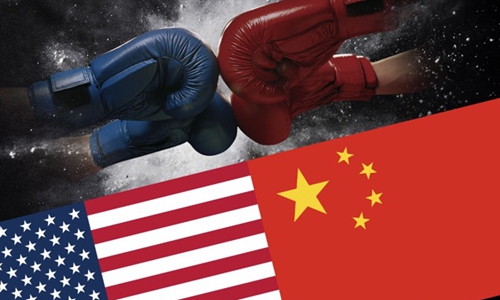China may 'strongly retaliate' if the US moves to intervene in internal affairs: experts
By Ma Jingjing and Zhang Dan Source:Global Times Published: 2020/5/28 13:13:40

China US Photo: GT
China may strongly retaliate if the US moves to add pressure on and intervene in China's internal affairs as it passed a decision to make the National Security Law for Hong Kong, experts said on Thursday. Measures could include punishing US companies involved in anti-China activities to impact the Hong Kong Special Administrative Region (HKSAR) and shutting down US intelligence agencies in Hong Kong, experts said.
As the National People's Congress, the country's top legislature, adopted draft decision on Hong Kong national security legislation on Thursday, some politicians in the US have used hawkish and threatening rhetoric in an attempt to block the law's passage.
US Secretary of State Mike Pompeo said on Wednesday (US time) that he has reported to US Congress that "Hong Kong is no longer autonomous from China."
In response to the US Chamber of Commerce's statement that the law could undermine the city's status as a business hub, a HKSAR spokesperson said on Thursday, "Any unilateral change of US policy toward Hong Kong would create a negative impact on relations between the two sides and harm the US' own interests."
Experts interviewed by the Global Times said that the US threats will not frighten China as it has accumulated rich experience in countering the US' unreasonable crackdown.
"China may resolutely impose sanctions on US companies helping anti-China US politicians in separating China, and may shut down US intelligence agencies in Hong Kong to deal a blow to US politicians spreading anti-China policies," He Weiwen, a former senior trade official and an executive council member of the China Society for World Trade Organization Studies, told the Global Times on Thursday.
He said that Hong Kong could impose tariffs on imported US products.
For the past decade, the US' trade surplus with Hong Kong has been the biggest among all its trading partners, totaling $297 billion from 2009-18. US exports of goods and services to Hong Kong as well as Hong Kong's direct investments in the US supported some 210,000 US jobs.
On Tuesday, US President Donald Trump said that the US is working on a "strong" response to the planned law for Hong Kong, though he did not elaborate, Reuters reported.
In a separate report, Reuters said the Trump administration is considering suspending Hong Kong's preferential tariff rates for exports to the US, citing people familiar with the matter. That would put Hong Kong's exports under the same tariffs imposed on products from the Chinese mainland.
"In fact, the US aims to use the law as an excuse to produce chain effects in separating China, dragging down the country's economy and weakening its global influence. Amid escalating tensions, there is no need for China to be constrained," Mei Xinyu, an expert close to China's commerce ministry, told the Global Times on Thursday.
China has plenty of countermeasures, Gao Lingyun, an expert at the Chinese Academy of Social Sciences in Beijing who is close to the Chinese government, told the Global Times.
"Different from the US' crackdown, China has made thorough calculations and considerate evaluations for the effects and impacts of every countermeasure in order to make the strike most effective," Gao said, noting that China may not rule out countermeasures against US service industries including culture, tourism and people-to-people exchanges.
"Due to a high service deficit with the US in the tourism and education sectors, China putting limitations on these industries would deal a heavy blow to the US' economic recovery following the coronavirus outbreak," Gao said.
He cited the US' anxiety to resume the air routes between the two countries, pointing out that if the US acts to deteriorate bilateral economic and trade cooperation or stops enhancing bilateral cooperation, there would be no need for China to make such efforts.
A report known as the beige book, released by the US Federal Reserve on Wednesday (US time), showed that businesses in the US are less optimistic about the country's economic outlook than the Trump administration.
The report noted that consumer spending and manufacturing had both dropped sharply, while workers' health concerns, restricted access to childcare and generous unemployment benefits will limit their return to work.
Posted in: ECONOMY,BIZ FOCUS